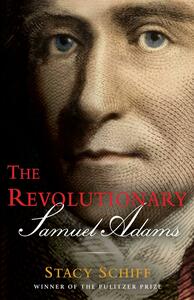Take a photo of a barcode or cover
challenging
informative
inspiring
medium-paced
Sometimes difficult to follow the details and complexities of the events that shaped Adams’ life and led up to the American revolution. But Schiff is clearly, joyfully scandalized and delighted by her subject. This is version of American history I have never read. Changed my perspective on that history and on Adams, of course.
This is less of a biography of Samuel Adams and more of a history of Boston and what people in Boston were wearing that just frequently mentions Samuel Adams (and what he was wearing).
But in all seriousness, this is poorly written, meandering, awkward, wordy, repetitive, full of unnecessary details — confusingly so — and in desperate need of a better editor.
But in all seriousness, this is poorly written, meandering, awkward, wordy, repetitive, full of unnecessary details — confusingly so — and in desperate need of a better editor.
challenging
informative
slow-paced
This was a very very labor intensive book. I tried to stick with it but ultimately couldn’t finish it. I learned a lot about Samuel Adams and the part he played in starting our revolution. He played a large role but it’s mostly forgetting to history. Ms schiff’s excellent research shows through in this very comprehensive book. I can’t say I will read another book by her but appreciate her ability to weave people together in a time period that was very eventful for our country.
She’s such a brilliant writer. Stick with it for the first 50 pages until you get the rhythm.
informative
medium-paced
The Revolutionary left me with a mixed perspective on its subject, Samuel Adams. I certainly know more about Samuel Adams and his role in the American Revolution, but I finished the book feeling like there was much more to know and understand. This fault, however, may not rest with the author as Adams destroyed many of his papers that may have provided insight into his strong, uncompromising revolutionary stand and his subsequent involvement in the government of the new republic. It was informative that Adams first concern was not making money from the Revolution. The same cannot be said of all of the founders. Adams' financial position was actually weakened over the years of the Revolution.
In summary, Stacy Schiff has written an accessible biography of Samuel Adams that may be enjoyed by many.
In summary, Stacy Schiff has written an accessible biography of Samuel Adams that may be enjoyed by many.
challenging
informative
slow-paced
There's a difference between being a Founder and a Revolutionary. Samuel Adams was definitely the latter, but he left most of the founding to his more famous second cousin, John. And Stacy Schiff's excellent biography tells us that while revolution-making might sound like more fun than the founding stuff, it's certainly a lot more dangerous.
For the first half of the 1770s, Adams was the unquestioned insurrection leader. King George certainly though so. It was Adams he most wanted to see dangling by the neck on a British hill. Schiff will keep you turning pages as she details the thrilling derring-do that led to the declaration-writing and nation-building. And the story echoes in today's media universe. Adams was well ahead of his time in his mastery of mass communication and the impact of the symbolic. From naming the "Boston Massacre" to dressing a group of colonists as Native Americans for some serious tea dumping, Adams engineered a popular uprising that eventually led to a "united" states, which Schiff reminds us was no tea party in itself.
If you're familiar with Schiff's "The Witches," you're well aware of her remarkable storytelling skills, even when the story contains the actions of multitudes, whether it's hysterical, tragic witch hunting or fomenting revolution. And Adams isn't the easiest of subjects. We learn a lot about his actions, but it's harder to know his personal life. He doesn't seem to have stopped running long enough to put his inner thoughts down on paper. Schiff makes a heroic effort, but Adams' family and his feelings about them often gets lost in the fog of revolution.
Although he wasn't much of a brewer (and he hated to be called "Sam"), Schiff's great and immensely readable book recounts the saga of a irreplaceable patriot.
For the first half of the 1770s, Adams was the unquestioned insurrection leader. King George certainly though so. It was Adams he most wanted to see dangling by the neck on a British hill. Schiff will keep you turning pages as she details the thrilling derring-do that led to the declaration-writing and nation-building. And the story echoes in today's media universe. Adams was well ahead of his time in his mastery of mass communication and the impact of the symbolic. From naming the "Boston Massacre" to dressing a group of colonists as Native Americans for some serious tea dumping, Adams engineered a popular uprising that eventually led to a "united" states, which Schiff reminds us was no tea party in itself.
If you're familiar with Schiff's "The Witches," you're well aware of her remarkable storytelling skills, even when the story contains the actions of multitudes, whether it's hysterical, tragic witch hunting or fomenting revolution. And Adams isn't the easiest of subjects. We learn a lot about his actions, but it's harder to know his personal life. He doesn't seem to have stopped running long enough to put his inner thoughts down on paper. Schiff makes a heroic effort, but Adams' family and his feelings about them often gets lost in the fog of revolution.
Although he wasn't much of a brewer (and he hated to be called "Sam"), Schiff's great and immensely readable book recounts the saga of a irreplaceable patriot.
I listened to the audio book and it was extremely hard to get in to. The information was interesting - just the writing was hard sometimes to follow.





